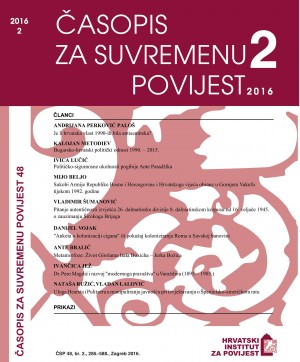Je li hrvatska vlast 1990-ih bila antisemitska?
Was the Croatian Leadership in the 1990s Anti-semitic?
Author(s): Andrijana Perković PalošSubject(s): Political history, Interwar Period (1920 - 1939), Post-War period (1950 - 1989), Transformation Period (1990 - 2010), History of Communism, Historical revisionism, Fascism, Nazism and WW II, History of the Holocaust, Cold-War History, Post-Communist Transformation, History of Antisemitism
Published by: Hrvatski institut za povijest
Keywords: anti-Semitism; the Holocaust; Holocaust denial; Franjo Tuđman; The Horrors of War; rehabilitation of the NDH; Jews in Croatia;
Summary/Abstract: The main goal of this paper is to discuss whether the first President of the Republic of Croatia Franjo Tuđman and the Croatian leadership in the 1990s were anti-Semitic. The minimization of the number of Holocaust victims and Holocaust denial, which includes statements that the Holocaust was a myth or a hoax produced by the Jews, are considered to be driven by anti-Semitism. These theories were present in historiography and later in politics. The outburst of political anti-Semitism, according to Western historians, can be found in Eastern Bloc countries after the collapse of their communist regimes. Croatia began its journey towards democracy and independence within this framework. Even before he became Croatian president, Tuđman was a controversial person due to his book Horrors of War: Historical Reality and Philosophy, which some circles described as anti-Semitic. Some of his statements were misinterpreted and his policy of national reconciliation, which meant ironing out the half-century-old political divisions between the Croats, was perceived as the rehabilitation of the Ustasha regime and its Independent State of Croatia (NDH), which carried out genocide against the Serbs, the Jews, and the Roma during World War II. Such widespread perception, supported by Serbian propaganda, prolonged the establishment of the diplomatic relations between the Republic of Croatia and the State of Israel until 1997. The relations between the Croatian leadership, Croatian people in general, and the Jewish community in Croatia in the 1990s were, however, very positive. Some established members of the Jewish community held high-ranking positions in the Croatian leadership. An appeal made by Nenad Porges, president of the Jewish community of Zagreb, to all the Jews in the world, in which he claimed that the Croatian Government was not anti-Semitic, proves the stability of those relations and the support of the Jewish community to Croatia during the Greater-Serbian aggression.
Journal: Časopis za suvremenu povijest
- Issue Year: 48/2016
- Issue No: 2
- Page Range: 291-329
- Page Count: 39
- Language: Croatian

